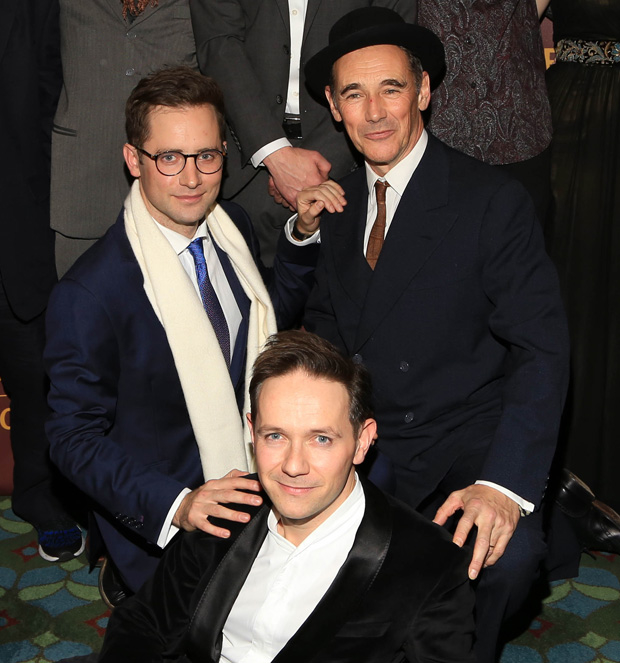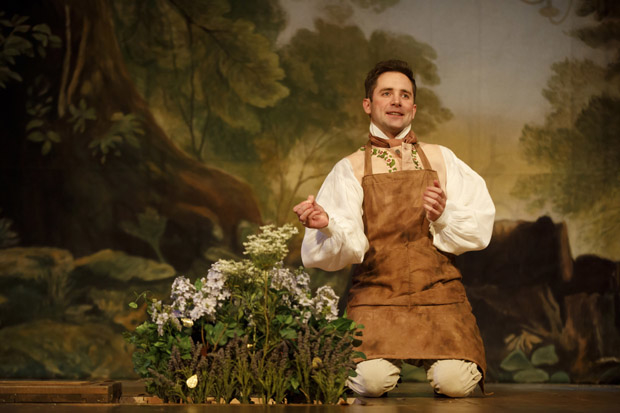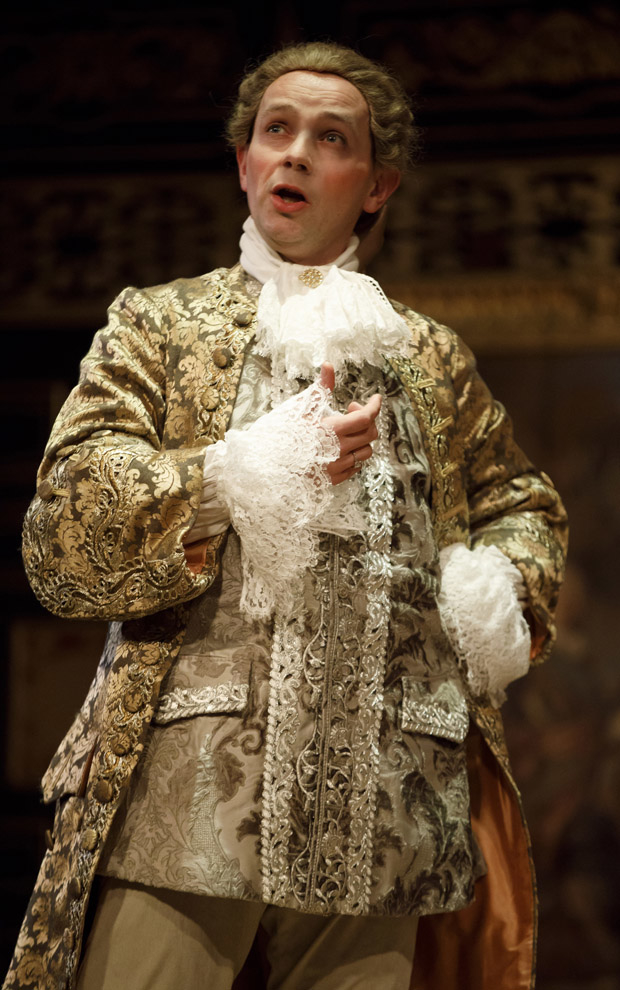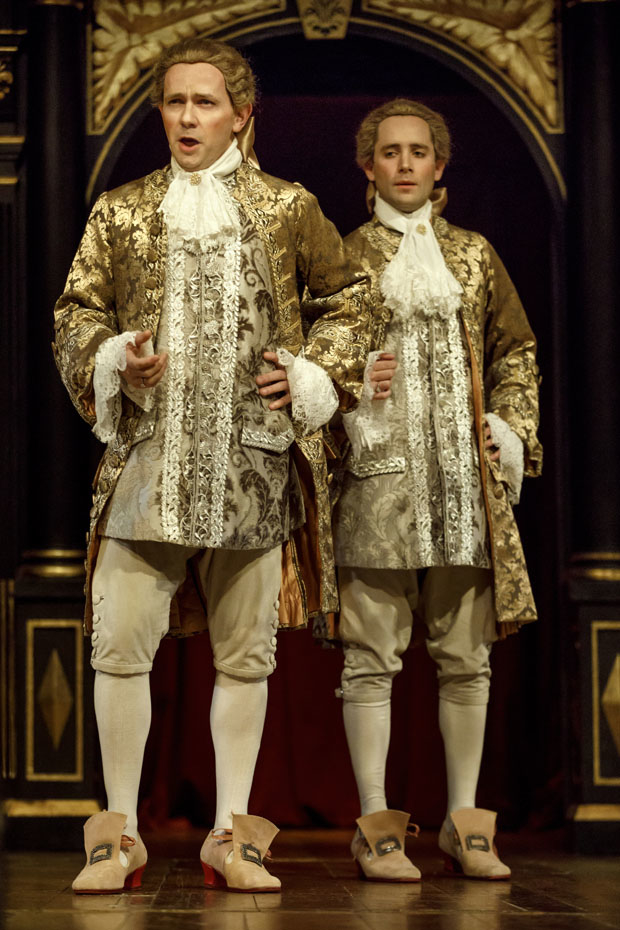Sam Crane and Iestyn Davies Share Farinelli With Each Other and Mark Rylance
In Claire van Kampen’s new play at the Belasco Theatre, Crane acts the role of an 18th-century castrato, while Grammy winner Davies sings the part onstage.
Carlo Maria Michaelangelo Nicola Broschi was one of the most famous Italian singers of the 18th century, but audiences would have known him only by the name Farinelli. Castrated at a young age, Broschi's soprano voice made him famous, but he gave it all up when he was hired by the court of King Philip V of Spain to sing privately on the belief that his voice might be able to cure the king's crippling depression. He never sang publicly again.
This story forms the basis of Farinelli and the King, a new play by Claire van Kampen at Broadway's Belasco Theatre. Headlined by van Kampen's husband, Tony and Oscar winner Mark Rylance as the King, the production features two performers taking on the role of Farinelli simultaneously: Sam Crane acts the role, while Grammy-winning countertenor Iestyn Davies sings several arias.
This double casting serves a purpose underlined in van Kampen's script. Early on, Crane and Davies realized that there were two people in Farinelli's body, the performer and the man, and we recently had the chance to talk to them both.

(© Tricia Baron)
Tell me about the staging process, and how the idea of having an acting Farinelli and a singing Farinelli came to be.
Iestyn Davies: Claire van Kampen comes from working at the Globe, where music is integral to all the plays. It was natural for her to write a play that has music in it. I don't think she conceived it being a dual part; she had written the part for an actor, and it had music. But I think as she put it together, she thought they couldn't just have the actor standing around with music off stage. I think Sam would agree, as we read the script, we started to realize that there are two people in his body: Farinelli, the performer, and Carlo Broschi, the man.
Sam Crane: It seems so completely natural in this piece of theater that it would be played by two different people. He's so obviously, torturously divided, as lots of people are in some ways. You get that with quite a lot of hugely celebrated performers, who feel some kind of necessity to separate that side of themselves with real, everyday self. It's especially true of Farinelli because of how it all came about, the mutilation of a part of himself, part of what he could have been. It seems absolutely integral to this character that he is split.
Iestyn: It makes sense to me as a singer, as well, compared to a pianist or a trombonist. They have an external instrument they can put away. Of course, they'd argue that they think about it all the time, but if I wake up and I feel like shit, that’s my career feeling like shit as well. It's difficult for me to separate being a singer and being a human being. Everything we do, even socializing or having a drink, has an effect on the career.

(© Joan Marcus)
Did you do any kind of background research, and was it helpful?
Iestyn: The 18th-century repertoire of the castrati in general is the basis of my performance career. I've done a CD of arias written for Guadagni. I had read about Farinelli, of course, and I knew enough musically to stay away from his repertoire.
Sam: I didn't know much about him. If you're playing a real-life character, there's a lot you can do, but this is Claire van Kampen's version of Farinelli. The part of the story that she decided to tell is actually a mystery. No one knows exactly why he went to Spain. We talked about it amongst ourselves, and I have an idea in my head of why the Farinelli I'm playing made that decision. But there's not, like, a letter where he says, "This is why…"
Iestyn: In a sense, even musical history is vague and a lot of it is conjecture. What we think we know about a certain singer, such as Farinelli, is hearsay anyway, based on reports of the day. What Sam is saying is how I feel about it. It doesn’t really help to know much about him, because none of the words are words he said in the first place. But, I am interested, from Sam's point of view, if he ever considered putting on a voice.
Sam: We did talk about that a bit, but as you say, we don’t know what a castrato sounded like in his speaking voice. A lot of what we're trying to do, what I felt was important about this divided character, was normalize him as much as possible. In this part of the story, he's trying to get away from this celebrity and this operatic persona. You don't want the audience to go, "What?"
Iestyn: We don't want to force down the throat of the audience this perception that he was different because he sang high. It's not just the height of the voice. Claire was going for the beauty of the voice, and what Sam was talking about: the man stuck in this famous person's body.
Sam: To talk in a falsetto voice would stop people being able to listen to this play and engage with this character as a human being.

(© Joan Marcus)
Iestyn, coming from the opera world, did Farinelli and the King take any adjustment on your part?
Iestyn: The most basic thing is that in opera, we have fewer performances by about 90 percent, and we have three days off in between performances. From that point of view, it's completely different. I find the whole life of working in one building with the same staff every single day a complete revelation, as opposed to what I do when I walk in an opera house. There are billions of people there who don’t know who you are. You're just a guest artist. So it's really special to be in a company.
Is there a difference in working with Mark Rylance, after his having won the Oscar, as there was when you all first started this process together in 2015?
Iestyn: I noticed one difference, offstage. We came to look at theaters here in March of last year. It was Claire, me, and Mark. He had just won the Oscar a month before. If you want to feel small, walk around with a recent Oscar winner. Everyone was stopping him. It was like meeting royalty.
On the subway, there was complete silence. Mark had his hat and glasses from Bridge of Spies on, because they used his prescription in the film. Eventually, this man goes, "Excuse me, sir, can I take a photograph?" and Mark goes, "I'd rather you didn't, it attracts attention." I said, "Mark, you're wearing your costume." And he laughed. You become a completely different interstellar beast.
Sam: It's probably different here on Broadway. He's such a figure, and has been for a while. In the second act, when we break the fourth wall, you can see people looking up at him in adoration. But he's really, really fun to be onstage with. He's always up for playing around and encourages that in the other performers, as well, which I really love.

(© Joan Marcus)










